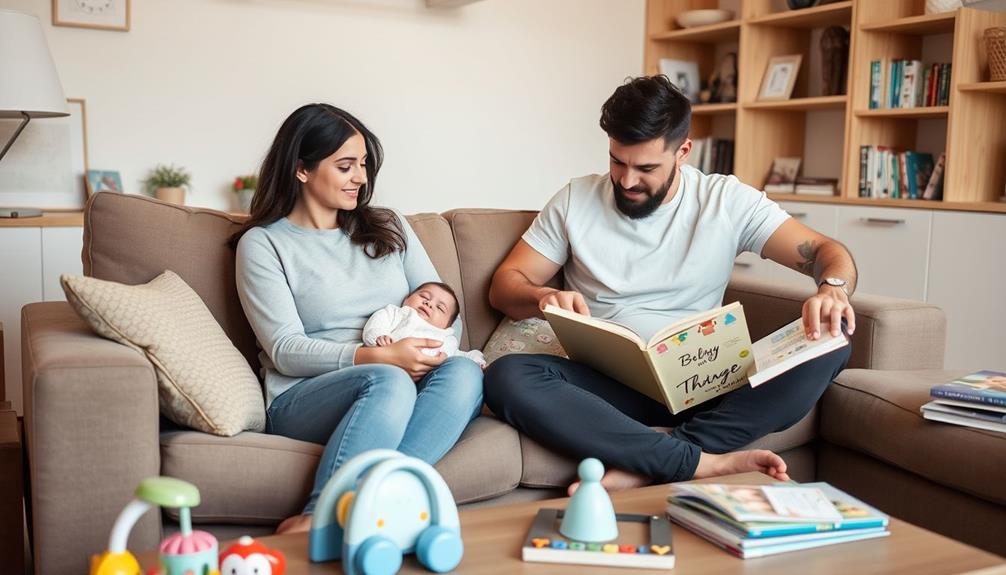If you're trying to decode whether your partner wants a baby, watch for subtle signs. He might bring up family topics, engage warmly with children, and show excitement about parenting discussions. Look for him emphasizing financial stability, suggesting future plans, and discussing values around parenting. Emotional maturity shines through when he handles conflicts well and expresses his feelings openly. If he actively participates in nurturing activities and demonstrates flexibility in life adjustments, these could be strong indicators. Curious about more signs? There are plenty of nuanced behaviors that can provide additional insights into his feelings towards starting a family.
Key Takeaways
- He engages in warm conversations about children, showcasing excitement and mental preparation for parenthood.
- Discussions about financial planning and stability indicate his serious consideration for the responsibilities of raising a family.
- His emotional maturity is evident in how he navigates conflicts and communicates feelings, essential traits for parenting.
- He prioritizes quality time together and engages in open dialogues about future goals, reflecting commitment to a stable family environment.
- His interest in parenting resources and discussions about child-rearing demonstrate a proactive approach to preparing for parenthood.
Positive Attitude Towards Children
When your partner actively engages in warm conversations about children, it's a strong sign they're mentally preparing for the joys and challenges of parenthood. This genuine interest can show up in various ways, reflecting a positive attitude towards children.
If you notice them excitedly discussing family life, aspirations, or even sharing funny anecdotes about kids, it indicates they're envisioning a future filled with laughter and love. Additionally, research shows that emotional support and a nurturing environment play a vital role in raising children, which may further influence their desire for family mental health support.
Their inclination to volunteer or participate in family activities further highlights their readiness for fatherhood. Watching them interact positively with children—playing games, reading stories, or simply engaging in meaningful conversations—can be a clear indicator of their enjoyment and potential for parenting responsibilities.
Moreover, if they're diving into parenting books or online resources, it suggests a proactive approach to understanding child-rearing. This commitment to gaining knowledge and insights about parenting emphasizes their serious intentions.
All these behaviors point to a partner who not only values the idea of family but also possesses a positive attitude towards children, making it an exciting prospect for your future together.
Financial Stability and Responsibility

Financial stability plays a pivotal role in the journey toward parenthood. If your partner discusses savings, budgeting, or long-term financial plans, it's a sign he's considering the responsibilities that come with having a child. A steady job with a reliable income often indicates he's serious about providing for a family.
When he talks about investments or future expenses related to raising kids, it shows his commitment to ensuring financial stability before taking that significant step. Additionally, he might be interested in strategies for diversifying investments to enhance financial security for a growing family.
You might notice him being more conscious of costs associated with raising children, like healthcare and education. This awareness reflects a responsible approach to family planning and an understanding of the financial demands involved. If he prioritizes achieving financial security before considering kids, it highlights his maturity and readiness for the responsibilities of parenthood.
Pay attention to how he navigates these discussions. If he actively engages in conversations about money management and planning, it's a promising sign that he's preparing for the role of fatherhood.
Financial stability doesn't just protect your future—it also lays a strong foundation for a loving, supportive family life.
Emotional Maturity and Supportiveness

Recognizing emotional maturity and supportiveness in your partner is just as important as understanding their financial readiness for parenthood. Emotional maturity is reflected in how they handle conflicts and communicate feelings. When your partner can resolve disagreements calmly and openly express their thoughts, it shows they're equipped for the emotional challenges of parenting.
Furthermore, their ability to navigate relationship dynamics with exes can indicate a level of emotional growth that bodes well for future family life, as it demonstrates their understanding of complex emotional situations and a willingness to learn from past experiences insights into potential complications.
A supportive partner demonstrates empathy during tough times and exhibits patience in everyday interactions. This support indicates readiness for the emotional demands that come with raising children. Additionally, when they take responsibility for their actions and decisions, it highlights their emotional maturity, essential for cultivating a healthy family environment.
Look for signs of emotional resilience, such as understanding and patience. These traits suggest your partner can manage the stresses of parenthood, ensuring a stable atmosphere for your future family.
Engaging in self-reflection about their readiness for parenthood and valuing emotional connections further illustrates a mature approach to family planning. If your partner exhibits these qualities, they likely possess the emotional maturity needed to begin the journey of parenthood with you.
Commitment to Relationship Stability

A strong commitment to relationship stability is essential for anyone contemplating parenthood, as it lays the groundwork for a secure environment where a child can thrive. If your partner actively prioritizes quality time with you and demonstrates a willingness to compromise on relationship issues, it's a positive sign. These actions showcase loyalty and trustworthiness—traits that are fundamental for family life.
Additionally, a healthy lifestyle, including regular exercise and stress management, can enhance your relationship dynamics and prepare both partners for the challenges of parenting, as maintaining overall well-being is significant for future family planning holistic lifestyle approach.
When your partner expresses confidence in your relationship, offering mutual support and understanding, it indicates a readiness to navigate the challenges of parenting together. This commitment to relationship stability not only strengthens your bond but also fosters an atmosphere where discussions about future goals, including family planning, can flourish.
Couples who engage in this kind of open dialogue tend to build a deeper connection, reinforcing their intention to create a nurturing family environment. If you notice your partner actively working on strengthening your relationship, it's a strong indication that they're considering parenthood.
Together, these elements create a solid foundation, making it clear that your partner values stability as a significant component of raising children.
Openness to Future Discussions

When your partner brings up family planning, it shows they're serious about discussing your future together.
It's important to approach these conversations with authenticity and openness, as they can reveal deeper feelings and aspirations.
If they're excited about shared parenting responsibilities, it indicates a willingness to adapt to life changes.
Engaging in these conversations can strengthen your connection and clarify your shared goals.
Future Family Planning Talks
Talking about future family planning can reveal a lot about your partner's mindset and intentions. If he frequently engages in discussions about having children, it shows he's seriously considering parenthood.
When he includes kids in future conversations—like potential names or parenting styles—it's a strong indicator that he's open to starting a family.
Additionally, if he's flexible in plans that accommodate future family dynamics, that's a positive sign of his willingness to adapt for parenting responsibilities.
Conversations about long-term goals that clearly include children reflect a deep commitment to building a family together.
You might also notice discussions about lifestyle adjustments and shared responsibilities for parenting. If both of you align on these topics, it indicates that you're on the same page regarding family life.
Ultimately, open and honest conversations about family planning not only help you understand his desires but also lay a foundation for mutual goals.
If he's keen to explore these topics with you, it's a promising sign that he's thinking about a future filled with children and shared family experiences.
Adaptability to Changes
Steering the journey of parenthood requires adaptability, and your partner's openness to future discussions can reveal a lot about their mindset. If they actively engage in conversations about family planning, including timelines for having children, it shows they're ready to become a parent.
This willingness to discuss potential lifestyle adjustments—like work-life balance and shared parenting responsibilities—indicates they're prepared to embrace the changes that come with starting a family.
When your partner demonstrates flexibility in their plans and receptiveness to new parenting dynamics, it signals they're considering the responsibilities and unpredictability of raising children. If they express enthusiasm about sharing parenting duties and discuss family roles, they're taking a proactive approach to adjusting to parenthood.
Moreover, if they initiate conversations about how family life will impact personal and professional goals, it highlights their commitment to managing the changes that parenthood will bring.
Ultimately, a partner who's open to these discussions shows they're not just ready to become a parent but also ready to adapt and grow alongside you in this new chapter of life.
Interest in Parenting Topics

When your partner shows enthusiasm for discussing parenting topics, it signals a genuine interest in child-rearing. This can include exploring creative parenting workshop ideas or sharing thoughts on effective family engagement strategies.
Engaging in conversations about different parenting styles or researching resources together can strengthen your connection and understanding. This shared exploration not only prepares you both for future responsibilities but also reflects a commitment to creating a supportive family environment.
Engaging in Parenting Conversations
Engaging in parenting conversations can reveal a lot about your partner's mindset and aspirations. If your partner actively discusses parenting styles or child-rearing philosophies, it shows a genuine curiosity about becoming a parent. This thoughtful consideration reflects their readiness for future responsibilities.
You might notice your partner:
- Actively seeking articles, videos, or workshops about parenting.
- Asking questions about friends' experiences with children.
- Expressing admiration for their family dynamics.
- Enjoying family gatherings or events involving kids.
- Sharing excitement about parenting responsibilities, like bedtime routines.
These behaviors indicate that your partner might be envisioning a future with kids. When they engage in these discussions, it reflects a commitment to understanding child development and a desire to foster connections in family life.
Their enthusiasm about topics like teaching moments or playtime suggests they're not just passively interested; they're actively preparing for the role of a parent. By noticing these signs, you can better understand your partner's aspirations and how they feel about starting a family together.
Researching Child-Rearing Resources
Researching child-rearing resources can be a telling sign of your partner's commitment to parenthood. If he's diving into parenting books, articles, or videos, it shows an active interest in understanding what it takes to raise a child. This behavior indicates he's preparing for future responsibilities and wants to be well-informed.
Moreover, when he engages in discussions about parenting styles or asks questions about friends' experiences, it reflects his curiosity about child development. His proactive approach suggests he's not only interested but also ready to tackle the challenges and joys of parenthood.
Attending workshops or seminars on child-rearing further emphasizes his desire to learn and grow in this area. If he's enthusiastic about roles like teaching or bedtime routines, it highlights his commitment to being involved and nurturing.
Encouraging open communication around these topics can strengthen your bond and mutual understanding. By sharing thoughts and feelings on parenting, you both can explore your visions for the future together.
Exploring Parenting Styles Together
Exploring different parenting styles together can be an eye-opening experience that deepens your connection. When you and your partner engage in discussions about child-rearing philosophies, it often reveals a genuine curiosity about having children in the future. This shared exploration can indicate that both of you're ready to contemplate the responsibilities that come with raising kids.
Here are some ways you can investigate parenting topics together:
- Read articles or watch videos about child development stages.
- Share thoughts on friends' parenting experiences and what you admire.
- Attend family gatherings to observe interactions with children.
- Discuss different parenting techniques and their potential impacts.
- Reflect on what qualities you'd like to replicate from friends or family who've kids.
When your partner shows interest in these topics, it suggests they're not just thinking about parenthood casually. Instead, they're open to envisioning a family and are enthusiastic to understand the joys and challenges of parenthood.
Health Consciousness and Lifestyle Choices

When your partner embraces health consciousness through balanced eating and regular exercise, it often signals a deeper commitment to future family life. You might notice them opting for healthier meals or hitting the gym more frequently, which could be influenced by their awareness of hydration strategies to optimize metabolism during the climb.
These lifestyle changes suggest they're preparing for the physical demands of parenthood. Quitting bad habits, like smoking or excessive drinking, can further indicate their desire to create a healthier environment for future children.
If they engage in activities that promote mental well-being, such as mindfulness or yoga, it reflects an understanding of the importance of mental health in parenting readiness. This awareness shows they're thinking about the emotional challenges that come with raising a child.
Additionally, a focus on creating a safe and nurturing home environment—like decluttering or child-proofing—demonstrates proactive thinking about family life. Positive lifestyle changes signal emotional growth and a commitment to being a responsible parent.
All these signs point to a partner who's not just living for today, but actively preparing for tomorrow's challenges. Embracing health consciousness together can be a strong foundation for a loving, supportive family.
Patience and Understanding

In the journey of building a family, patience and understanding become essential pillars that support your relationship and parenting approach.
When you notice your partner displaying patience in challenging discussions about future family plans, it's a strong indicator of his readiness for parenthood. His ability to manage emotional ups and downs showcases the resilience needed for parenting's trials.
Engaging in playful activities with children not only reveals his nurturing side but also highlights the importance of play in fostering emotional well-being and social skills.
Consider these signs of his patience and understanding:
- He listens attentively when you discuss parenting responsibilities.
- He engages in playful activities with children, showing his nurturing side.
- He demonstrates empathy in daily interactions, reflecting emotional maturity.
- He's open about the challenges of parenting and prepares mentally for them.
- He remains calm during stressful moments, indicating strong emotional control.
These behaviors reveal not just his desire for a family, but also his commitment to navigate the complexities of parenthood with you.
A partner who embodies patience and understanding is likely to create a nurturing environment, fostering a healthier family dynamic as you both commence on this rewarding journey together.
Strong Communication Skills

Strong communication skills are essential for steering through the complexities of parenthood as a couple. When your partner initiates discussions about future family plans, it's a strong indicator that they're considering the possibility of having children. Actively listening to each other's thoughts on parenthood fosters a deeper understanding of your readiness to commence on this journey together.
Additionally, being able to discuss the importance of quality assurance in the decision-making process reflects a thoughtful approach to parenting.
Sharing personal feelings and aspirations openly creates transparency, allowing both of you to gauge your emotional readiness for parenthood. Strong communication skills also manifest in how you handle disagreements. Constructive conflict resolution through effective dialogue shows commitment to maintaining a healthy relationship, even when discussing parenting responsibilities.
Moreover, when your partner discusses the importance of being a role model for children, it reflects their understanding of the responsibilities that come with parenthood. Engaging in inquiries about each other's feelings towards having children can clarify intentions and strengthen your foundation for family planning discussions.
Vision for the Future

When you talk about long-term family goals, it often reveals your partner's desire for children and a stable home environment.
These discussions can show how both of you envision building a nurturing space for your future family. Additionally, understanding the responsibilities of pet ownership, such as the importance of regular vet check-ups, can reflect your partner's readiness for a family.
Pay attention to these conversations, as they can give you important insights into your partner's aspirations.
Long-term Family Goals
Long-term family goals shape the vision you and your partner have for your future together. If you find yourselves frequently discussing aspirations about raising children, it's a strong indicator that he wants kids. This desire often emerges through conversations about living conditions, such as needing more space for a growing family.
When he mentions shared future milestones, like planning vacations or experiences with kids in mind, it reflects a commitment to building a family life together. Additionally, discussing values related to parenting demonstrates serious contemplation about family roles, showing he's invested in the idea of parenthood.
Consider these signs that indicate his long-term family goals:
- Talks about needing a larger home
- Plans vacations with children in mind
- Discusses values and traditions for raising kids
- Considers educational opportunities for potential children
- Expresses interest in extracurricular activities for kids
These conversations and considerations are essential. They reveal not just a desire for a family but a proactive approach to planning a future together.
If he's expressing these sentiments, it's clear he's thinking about a life that includes kids.
Stable Home Environment
Creating a stable home environment is essential for nurturing a family. If your partner frequently talks about needing more space or discusses moving to a quieter, family-friendly neighborhood, it's a strong indication they envision a nurturing space for future children.
These conversations highlight their desire for a stable home environment that promotes growth and safety for your family.
When your partner expresses long-term relationship goals that include family planning, it shows a commitment to building a secure and supportive environment for kids. Additionally, if they mention creating family traditions or planning vacations with children in mind, it reflects a proactive mindset towards establishing a meaningful home life.
Discussions about values related to raising children, such as education and extracurricular activities, further emphasize their vision for a family-oriented future.
These topics reveal that they're not just thinking about immediate needs but are also focused on what's best for your potential children.
If you notice these signs, recognize that your partner is actively considering how to create a stable home environment, setting the foundation for a loving and nurturing family life.
Inquiry About Readiness

Steering through the topic of readiness for children can feel intimidating, but it's essential for establishing a shared vision in your relationship. When your partner starts to inquire about your feelings towards having kids, it's a clear sign they're serious about family planning. Engaging in these discussions shows they're ready to take steps toward exploring parenthood together.
Consider these signs your partner is looking to discuss readiness:
- They ask about your thoughts on starting a family.
- They share their own feelings about having children.
- They suggest planning for a future that includes kids.
- They express interest in your individual priorities regarding parenthood.
- They're open to discussing any differences in opinions.
These conversations indicate a commitment to mutual consideration and collaboration. By evaluating your situations and priorities together, you both reflect thoughtful contemplation and emotional readiness.
If your partner is engaging you in these discussions, it's a strong indicator that they're not just dreaming but actively thinking about the next steps in your journey together. Being open and honest about your readiness will help strengthen your bond and pave the way for future decisions.
Flexibility in Life Adjustments

When you think about your partner's readiness for parenthood, consider how flexible they're with change.
Their ability to adapt plans and embrace new parenting challenges can reveal a lot about their approach to family life.
Observing their willingness to shift routines shows they're prepared for the unpredictability of raising children together.
Embracing Change Readiness
Embracing change is essential for anyone preparing for the journey of parenthood. You might notice that your partner shows flexibility in life adjustments, reflecting a readiness for family life. This adaptability highlights their willingness to modify existing routines and share responsibilities, which is vital in parenting.
Here are some signs that indicate your partner's readiness to embrace change:
- Open discussions about potential lifestyle adjustments.
- A positive attitude towards unexpected challenges.
- The ability to navigate stress without getting overwhelmed.
- Demonstrating resilience in the face of new responsibilities.
- Expressing excitement about shared parenting tasks.
When your partner exhibits these traits, it suggests they're emotionally prepared for the challenges ahead. Their openness indicates serious consideration of future parenting roles, reinforcing the idea that they can adapt to the unpredictability of raising children.
Flexibility in mindset and actions is a strong indicator that they're ready to undertake this transformative journey together with you. Recognizing these subtle signs can help you understand their desire for a family and their commitment to making it a reality.
Adapting Parenting Scenarios
Adapting to parenting scenarios requires a willingness to shift your plans and routines, as life with children often comes with surprises. When you demonstrate flexibility—like adjusting your social calendar for family-friendly activities—it shows you're ready to embrace the unpredictability that parenting brings. This adaptability is essential in preparing for a future with kids.
Talking to your partner about potential lifestyle changes is important, especially if you're considering moving to a more family-oriented neighborhood. Engaging in these discussions highlights your commitment to adapting your life for the sake of parenthood.
It's also necessary to share responsibilities; openly discussing how you'll divide tasks in parenting reflects a strong understanding of the collaborative effort needed.
Moreover, if you find yourself thrilled about family vacations or child-inclusive experiences, it signals your enthusiasm to integrate parenting into your future plans.
Increased Nurturing Behaviors

Increased nurturing behaviors can reveal a lot about your partner's evolving mindset, especially regarding future family dynamics. If you notice your partner exhibiting these signs, it may indicate a growing desire for fatherhood rather than raising red flags:
- Actively engaging with friends' kids or volunteering for family activities
- Frequently discussing child-rearing topics, like parenting styles or milestones
- Taking on more responsibilities at home, such as cooking or planning outings
- Showing pronounced affection towards pets or younger family members
- Expressing admiration for parenting-related content, like books or documentaries
These behaviors suggest your partner isn't just thinking about having children, but is also starting to embrace the nurturing role that comes with it.
If you see these increased nurturing behaviors, it's a good sign that he's exploring his feelings about fatherhood. While it's important to communicate openly about family plans, recognizing these signs can help you gauge his readiness for a family.
Just be mindful of any potential red flags that might surface during discussions, ensuring that both of you're on the same page regarding future aspirations.
Engagement in Family Planning

Noticing your partner's nurturing behaviors can naturally lead to deeper conversations about family planning. If he frequently discusses future family goals and aspirations, including the desire for children, it's a strong sign of his engagement in this process.
Pay attention to whether he mentions needing a larger living space or a family-friendly environment; these hints often reflect his desire to accommodate future kids.
Moreover, if he expresses interest in parenting resources—like books or workshops—it shows he's taking a proactive approach to understanding family dynamics and responsibilities. Conversations about timelines for having children or discussions about parenting styles indicate that he's seriously considering the idea of parenthood.
You might also notice him actively participating in family-oriented activities, such as spending time with friends who've children. This engagement can signal his readiness to dive deeper into discussions about starting a family.
All these behaviors suggest he's not just daydreaming; he's genuinely thinking about what it means to build a family together. Recognizing these signs can help you gauge his readiness and willingness to initiate this journey with you.
Discussions About Parenting Roles

When you and your partner start discussing parenting roles, it often reveals a lot about each other's values and readiness for family life. These conversations can indicate how serious he's about getting ready for a family. When he engages in these discussions, it shows he's genuinely interested in understanding the responsibilities that come with raising children.
Consider the following signs during your discussions about parenting roles:
- He asks about your experiences with children or shares stories from friends' parenting journeys.
- He reads articles or watches videos related to child-rearing, showing he's invested in learning.
- He expresses enthusiasm for specific parenting tasks, like teaching or bedtime routines.
- He initiates conversations about family traditions and values he'd like to instill in future children.
- He discusses different parenting styles and philosophies, indicating a desire for alignment.
These discussions not only reflect his curiosity but also his commitment to thoughtful planning for a future family. If he's actively involved in these conversations, it's a strong indication that he's serious about taking on the responsibilities of parenthood.
Frequently Asked Questions
How Do You Know When a Man Wants a Baby?
You can tell a man wants a baby by observing his conversations and interests. If he engages in discussions about parenting or expresses excitement about family activities, that's a good sign.
Pay attention to his long-term goals; if he includes children in them, he's likely serious. Additionally, if he shows financial responsibility and affection in your relationship, it reflects his readiness for the responsibilities that come with parenthood.
Look for these signals to gauge his intentions.
What Makes a Man Want to Have a Baby With You?
Imagine cozy evenings spent dreaming about the future, where laughter fills the air and little feet run around.
When a man envisions this warmth with you, it sparks his desire for a baby. He might chat about family life, show joy with kids, or discuss building a stable home.
If he emphasizes commitment and teamwork, it's a sign he's ready to take that leap into parenthood with you by his side.
Why Do Men Act Like Children in a Relationship in Psychology?
Men can act like children in relationships for various psychological reasons.
You might notice them seeking validation or attention due to unresolved emotional needs. They could be replicating parental dynamics, showing dependency or avoiding responsibilities.
In stressful situations, they may revert to childlike traits as a coping mechanism.
Additionally, if he's an anxious attachment style, he might cling to these behaviors to maintain emotional closeness and avoid abandonment.
Why Do I See My Boyfriend as a Baby?
You might find yourself viewing your boyfriend in a more tender light, almost as if he's a little one needing care and affection.
This perception could stem from your nurturing instincts, reflecting a deep emotional bond.
Perhaps it's your way of expressing intimacy, revealing a desire for connection.
It might also indicate your thoughts on future family life, highlighting your readiness to embrace responsibilities that come with nurturing someone you love.
Conclusion
So, while he might not be wearing a "Baby On Board" shirt just yet, those subtle signs could be his way of saying he's ready for a little one. Who knew that his increased interest in diaper commercials and late-night baby name discussions were just innocent hobbies? If you're picking up on these hints, it might be time to chat. After all, the guy who can't even keep a houseplant alive might just surprise you when it comes to parenting!










